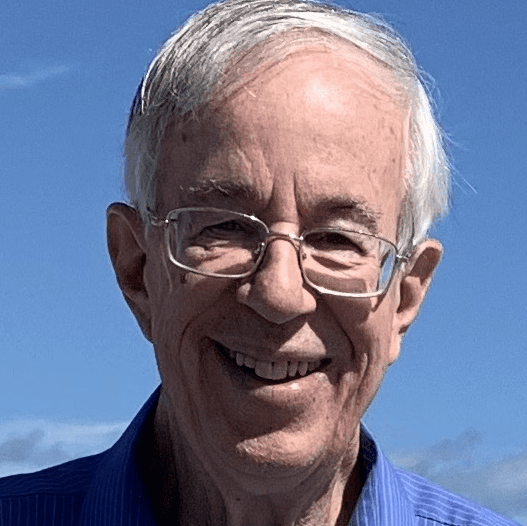God After Darwin
with
John Haught
AVAILABLE IMMEDIATELY AND 24/7
VIA STREAMING VIDEO

God after Darwin
with John Haught
Darwinian science vastly extends the story of life and life's suffering (and creativity as well) beyond those of traditional theological awareness. In what sense, then, after Darwin, may believers still sustain faith in divine providence or uphold a firm sense of values, if at all?
Is it perhaps possible that evolutionary portraits of life may open up fresh ways of thinking about God and the meaning of religious, and especially Christian, faith? After Darwin can we have a plausible understanding of God and faith that is consistent with traditional beliefs and core ethical aspirations while at the same time being in harmony with scientific understandings of evolution? Time will be allowed in each session for discussion by the participants.
1. Darwin and Faith: What is at stake?
Why do half of the Christians in the United States reject evolutionary biology? How might theology respond to both Darwin and those who reject his understanding of life? What would theology look like if it embraced evolutionary science enthusiastically?
2. How much can evolutionary biology explain?
Some scientists and philosophers believe that Darwin's theory of evolution by natural selection is powerful enough to explain fully everything going on in life including why humans are intelligent, moral and (often) religious. This lecture seeks to explain why Darwinian explanations are so important today, and what they imply as far as faith and theology are concerned.
3. Darwin, God, and the "New Atheism."
Richard Dawkins and Daniel Dennett are devout evolutionists who think that after Darwin there can be no intellectually plausible reasons for believing in the existence of God. This lecture examines and responds to the claims of these and other so-called New Atheists who try to make Darwinian biology the intellectual core of their critiques of religion.
4. God and Darwin after Einstein.
What does Darwin's science look like, and what shape may theological reactions to evolutionary biology have, if we now place the story of life inside the new scientific story of the universe?
John F. Haught (Ph.D Catholic University, 1970) is Distinguished Research Professor, Georgetown University, Washington DC. He was formerly Professor in the Department of Theology at Georgetown University (1970-2005) and Chair (1990-95). His area of specialization is systematic theology, with a particular interest in issues pertaining to science, cosmology, evolution, ecology, and religion. He is the author of 22 books. His latest books, God After Einstein, The New Cosmic Story: Inside Our Awakening Universe, A John Haught Reader: Essential Writings on Science and Religion and Resting On the Future: Catholic Theology for an Unfinished Universe.
Haught has also authored numerous articles and reviews. He lectures internationally on many issues related to science and religion. In 2002 he was the winner of the Owen Garrigan Award in Science and Religion; and in 2004 the Sophia Award for Theological Excellence. He testified for the plaintiffs in the Harrisburg, PA “Intelligent Design trial” (Kitzmiller et al. vs. Dover Board of Education); in 2008 he received a “Friend of Darwin Award” from the National Center for Science Education. In Fall 2008 he held the D’Angelo Chair in the Humanities at St. John’s University in New York City. In April 2009, for his work in science and religion, he received an honorary doctorate from Louvain University, Belgium. He and his wife Evelyn now live in Vero Beach, Florida. Email: haughtj@georgetown.edu
PROGRAM DETAILS
Dates: ANYTIME - NOW STREAMING ON-DEMAND VIA VIDEO REPLAY
Time: 24 / 7
Cost: $60.00 ON-SALE ($80.00) Please do not let cost deter you from attending - Click Here to learn more about funding
Location: Zoom on-line – a link will be sent to you a few days before the program begins.
CLICK THE GREEN BUTTON below to Register
4 Sessions
2 hours each
ON-DEMAND
Available 24 / 7
$60 ($80)
Registration Open Now
Program begins in ...
While this progam has begun, video replays of each session are available with Registration. Join now to watch previous weekly sessions and catch-up before the next live one.
FAQs
- How many people per class?
While we can accomodate as many attendees as needed in our online seminars, some seminars are limited in numbers due to facilitator / speaker requests. Where numbers are larger than normal, breakout groups may be created to allow for small group discussion and exercises.
- How do I pay?
Links are provided to the Shopping Cart / Payment Gateways on the Course page.
- Can I view a class on my phone?
As we use Zoom Conferencing software, most recent Smartphones allow for Zoom Streaming to cell phones. If you would prefer to call in via non-video access, Zoom links include call in phone numbers.

